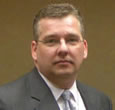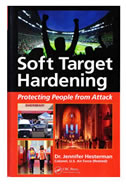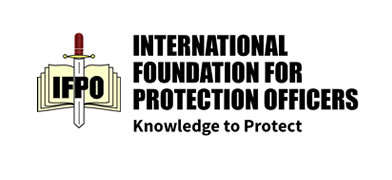 Call
for Authors! Call
for Authors! |
We would like to extend an invitation to all IFPO members to submit articles for inclusion in our quarterly newsletter. Articles contributed by our members will help us to continue putting together a quality and informative newsletter each quarter.
Interested members should submit their articles in a word document and email them as an attachment to Sandi J. Davies at sandiifpo@earthlink.net.
|
| Sandi Davies Receives Karen Marquez Honors Award |
Sandi Davies, Executive Director, International Foundation for Protection Officers (IFPO), was honored at the 3rd Annual ASIS Women in Security Council 'Karen Marquez Honors' event during the ASIS International 61st Annual Seminar in Anaheim, California.
The prestigious honor is presented annually to four ASIS International security professionals. All of the honorees, and those who were nominated, have consistently worked for the betterment of the security industry over an extended period to “Support, Inspire and Promote” women in the industry. |
 |
Read the full article
|
| Meet the IFPO Board |
 |
K.C. Poulin is President and CEO of Critical Intervention Services (CIS), a dynamic and leading Florida-based private protection agency. For more than twenty years, CIS has specialized in providing protective services for high threat and escalated environments as well as expert public safety services for living communities. Poulin leads the company in its business development and growth efforts, pioneering innovative ideas to effectively assess and manage security |
needs for individuals, communities and organizations worldwide. Poulin’s experience is rooted in more than two decades in the fields of law enforcement, security operations, threat management, executive protection and public safety in high crime communities. Poulin also has extensive experience in the areas of critical infrastructure, critical incident management, anti-terrorism operations and disaster response.
Poulin graduated from Executive Security International as a Certified Protection Specialist and has received extensive training in the areas of emergency management, critical incident management, terrorism, extremism, juvenile violence and prevention, executive protection and workplace violence. He is certified by FEMA in Emergency Response to Terrorism and has been awarded Level III Homeland Security certification from The American Board for Certification in Homeland Security. Poulin has also received certification as a Certified Protection Officer Instructor (CPOI) through the International Foundation for Protection Officers (IFPO) and has been appointed to the Board of Directors for IFPO.
Read complete bio |
|
|
| ASIS International 2015 Security Book of the Year Award |
Hesterman, US Air Force (Retired), with its Security Book of the Year Award on September 28, 2015 at the ASIS International 61st Annual Seminar and Exhibits in Anaheim, Ca. Hesterman’s award-wining book, Soft Target Hardening: Protecting People from Attack was published in 2014.
“This book addresses one of the foremost threats facing security management professionals globally today. Dr. Hesterman’s professional background provides a unique and invaluable perspective to the topic,” noted award committee chair Lawrence J. Fennelly, CPO, CSS, himself author and editor of more than 30 security books. |
 |
Soft Target Hardening: Protecting People from Attack starts the national dialogue by providing case studies, best practices and methodologies for identifying soft target vulnerabilities and reducing risk in the US. It offers deterrence and mitigation techniques from more than 275 sources.
The book may be purchased online in the ASIS Store. |
|
| Emergent Threat: Stabbing Attacks in Schools |
By Dr. Jennifer Hesterman, Colonel, USAF (retired)
Gun attacks are obviously the most feared assault, since mass casualties are inflicted in a short period of time. However, as our focus naturally centers on keeping guns out of schools with recent mass shooting incidents, we can’t forget that knives are easier to conceal and transport, and can also inflict significant bodily harm in a short period of time.
We confiscate more knives in schools across the country than guns, and knifing incidents are on the rise across the nation. Between April 2012 and November 2015, there were 24 serious or fatal stabbings at schools in the U.S. and many more worldwide in surprising locations such as Ireland and Sweden. In the 2010-11 school year, according to the Department of Education, public schools reported 5,000 cases of student possession of a firearm or explosive device, and an alarming 72,300 cases of possession of a knife or other sharp object. Since school behavior is reflective of societal trends, it is also important to note that knifing deaths in the U.S. are prevalent and on the rise; there are over 1,600 stabbing murders annually, constituting 16% of all homicides.
One factor driving a perpetrator to use a knife instead of a firearm is that knives are much easier to obtain.
Read the complete article
|
| How the Campus Carry Bill MAY Impact School Shootings |
By Michael J. Fagel, Ph.D., CEM & Lawrence J. Fennelly, CPOI, CSSI
On Valentine’s Day, 2008, a former Northern Illinois University (NIU) sociology student entered the Cole Hall lecture room at NIU and opened fire, killing five people and injuring at least 21 other students.
I responded with a team to assist in the critical incident stress management and aftereffects of the horrific incident. With no emotion and a hollowness in their eyes, the responders relayed details that I’ll never forget: phones clutched in victims’ hands as they dialed 911, blood splattered across the lecture room floor, students cowering under desks with their textbooks
After decades of responding, planning for and studying crisis management and active shooters, this case struck home for me, as I teach at NIU.
Seven years later, the United States continues to experience deadly school tragedies. One of the most recent incidents took place at the Umpqua Community College in Roseburg, Oregon, leaving our country desperate for answers to tough questions: How do we stop school shootings? Should we ban guns in the United States? Can arming our students and educators better protect our schools? Unfortunately, none of these questions have been answered.
However, some states are trying to address these issues with controversial bills. For instance, in June of 2015, Texas lawmakers passed a bill that would allow concealed weapons to be carried on campus. The University of Texas at Austin has become the center of the controversy as protests broke out on campus. While the bill may have good intentions, it’s important that lawmakers and educational leaders carefully and thoughtfully evaluate their proposed actions. In the face of such tragic circumstances, we should fully consider the nuances of school shootings in the United States before implementing drastic changes.
Read the full article
|
| Top 10 States with School Violence Threats |
Rank |
State |
# of Threats |
1
2
3
4
5
6
7
8
9
10 |
Ohio
California
Pennsylvania
New York
Florida
Texas
Michigan
Washington
Massachusetts
Connecticut |
64
60
55
46
43
41
36
37
34
29
|
Threats made between August 1 - December 31, 2014
Source: Security Magazine November 2015
|
| How Public And Private Security Operations Protect Celebrities, Big-Name Executives And Dignitaries |
By Michael Fickes End User Correspondent, SourceSecurity.com US Edition
The Pope’s visit to the United States reminds us that protecting big-name executives, celebrities and dignitaries is a highly specialized security function. Public and private executive protection groups begin preparing for the visit of major world figures months ahead of time.
“It is a task of massive proportions,” says Tom M. Conley, CPP, CISM, CMAS, president and CEO of The Conley Group, Inc. “The Pope, presidents, presidential candidates and others want to meet people, and they often plunge into crowds.” Then again, Conley notes that unlimited public and government assets become available to protect major public figures like the Pope. Their safety is of the utmost importance, and public agencies invest huge amounts of time and resources in their protection.
Read the full article
|
| A Cadre of Instructors (or Ambassadors) |
By Chris A. Hertig, CPP, CPOI
Substantial numbers of persons are teaching Homeland Security, Security Management, Crisis Management, etc. at colleges around the world. In the US, Protective Services programs are thriving in secondary schools. And there are large numbers of state or provincial instructors delivering government mandated training.
Lots of folks are teaching Security!
Standards for instructors which establish baseline knowledge would certainly make a lot of sense. The body of knowledge within Security/Loss Prevention/Crime Prevention needs to be studied - and challenged. Retail Loss Prevention personnel utilize the same concepts as those involved in nuclear security. The applications differ, but the underlying theories are the same. Physical Security is Physical Security.
Read the complete article |
| Test Yourself: Effective Communications |
1. Effective communications is the faithful reproduction of which of the following?
a. Thoughts.
b. Ideas.
c. Observations.
d. All the above.
2. The term “faithful reproduction” means which of the following?
a. The message was timely.
b. The message was brief.
c. The message was both received and understood.
d. The message was expected.
3. The law expects business owners to perform “due diligence” to protect from accidents and harm by third parties, those who visit their businesses. Those who do not take that special care may be considered liable if someone gets hurt. It must be shown that the business took which of the following actions?
a. Observed foreseeable loss events which might bring harm to visitors of the business.
b. Reported the findings of potential danger to those who would be affected.
c. Took the actions necessary to mitigate foreseeable loss events.
d. All the above.
4. Which of the following is not a channel of communication?
a. Top-Down only.
b. Bottom-Up only.
c. Face to Face.
d. Top-Down/Bottom-Up.
5. The essentials of effective communication include all of the following except
a. it is timely.
b. it is formal.
c. it is concise.
d. it is factual.
6. Which of the following is the one misconception of report writing that causes the most errors in report writing?
a. Brevity.
b. Conciseness.
c. Clear.
d. Timely.
7. Which of the following is a primary mobile communications device almost all protection officers use?
a. Two-way radio.
b. Land-line telephone.
c. Cell phone.
d. None of the above.
Answers: 1. D, 2. C, 3. D, 4. C, 5. B, 6. A, 7. A |
| |
|
|
|
|

